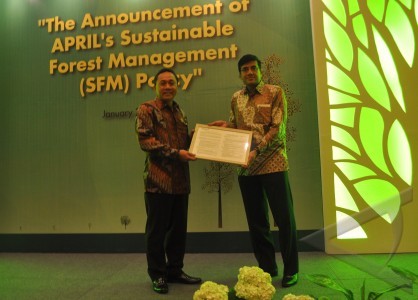Positive reception to the announcement of APRIL’s Sustainable Forest Management Policy
There has been quite a buzz following the official launch in Jakarta last week of our most comprehensive policy yet to achieve Sustainable Forest Management.
The policy builds on more than a decade of conservation and land management initiatives developed by APRIL. But it also introduces significant new commitments from the company including:
- A moratorium on plantation development anywhere that assessments to identify High Conservation Value Forests (HCVF) have not been completed;
- An end to the establishment of new plantations by December 2014;
- By 2019, a mill wood supply that is entirely taken from plantations;
- Doubling the size of our forest restoration program to 40,000 hectares;
- Striving to support conservation areas equal in size to APRIL’s plantation areas;
- An independent Stakeholder Advisory Committee to oversee implementation of APRIL’s Policy.
We are gratified by the early reception to our newly strengthened Policy. Congratulations came on the day of its announcement from Indonesia’s Minister of Forestry and Norway’s Ambassador to Indonesia.
Predictably, our new commitments have been greeted with the same tired, inflammatory rhetoric by a handful of critics who oppose sustainable forest development in Indonesia. They continue to accuse APRIL of “deforestation.”
But the fact is we are reforesting Indonesia, not deforesting it. The proof? We conserve more than 250,000 hectares of prime forest. We do this by conducting independent conservation assessments to identify and protect High Conservation Value Forest (HCVF). We then develop plantations only on areas that are non-HCVF, in other words, degraded forests. In this fashion we improve the productivity of Indonesian forest land.
That’s not all we do to reforest Indonesia. We have committed to restoring another 40,000 hectares of forest. We are planting 150 million trees a year. And now we have made new industry-leading commitments to forest protection and sustainable development.
We’ve also heard misleading criticism that our policy doesn’t commit APRIL suppliers to the same rigorous forest protection standards we’ve adopted for our own concessions. That’s just not true. We’ve mandated that our suppliers follow strictly our requirements on HCVF assessments. Our moratorium extends to suppliers whose concessions have yet to be assessed. Like APRIL, long-term suppliers must complete plantation establishment by the end of this year. Our Policy ensures that our entire supply chain will be sustainable.
I’ve been around long enough in the Indonesia forestry industry to know that despite these commitments, there will be some who doubt us, who will say APRIL’s Policy doesn’t go far enough, fast enough.
That’s OK. We understand there will be skeptics. But here’s my response to them: you won’t have to take our word for it. We will now have an independent panel of forest experts on the Stakeholder Advisory Committee. It will be their job to make sure that we meet our commitments. They will report publicly on our progress and shortcomings.
Sustainable Forest Management is essential to Indonesia’s future. It is of utmost importance to our customers and the environmental organizations such as WWF that track our performance. We want you to know that it is our priority, too.
Creating a strengthened Sustainable Forest Management Policy was the easy part. The real challenge – fulfilling our promise – begins now. You have my assurance that we will succeed.
Praveen Singhavi
President,
APRIL





